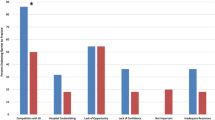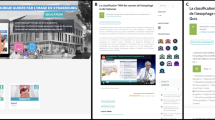Abstract
Background
The purpose of this study was to examine the effectiveness of the SAGES flexible endoscopy course in improving fellows’ attitudes, confidence, and skills related to implementing endoscopy in practice.
Methods
Fellows participated in a 2-day course consisting of case presentations, expert panels, and hands-on laboratory training. Before and after the course, fellows completed a questionnaire assessing demographics, experiences in residency, practice plans, plans to implement flexible endoscopy in practice, and level of confidence performing 15 endoscopic procedures. Half of the fellows were randomly assigned to complete pre- and post-skills testing using a previously validated endoscopic targeting model.
Results
Fifty-four fellows (90 %; age 33.5 ± 2.8; 58 % male) completed the pre- and post-questionnaire. All MIS fellowship types were represented. Almost half (48 %) reported none or very little flexible endoscopy in their current fellowship. The average prior case volume among those completing an ACGME-approved residency (42/54) was 76 upper and 75 lower endoscopies with one-third reporting no experience in therapeutic EGD (33 %) or polypectomy (31 %). Intentions to implement flexible endoscopy in practice significantly improved after the course overall (3.72 ± .85–3.92 ± .69, p < 0.05; 1 = never; 5 = very frequently). Prior to the course, 39 % of fellows reported plans to use endoscopy in practice “occasionally” or “rarely.” After, this decreased to 28 with 72 % planning to implement “frequently” or “very frequently.” Mean levels of confidence performing all 15 endoscopic tasks improved significantly after the course. Skills performance for the 27 fellows improved significantly as well; participants decreased their time to perform the targeting task by 40 % (222.3 ± 119.8–133.0 ± 70.1 s; p < 0.001) and decreased errors by 49 % (2.9 ± 1.7–1.5 ± 1.5; p < 0.001).
Conclusions
These results indicate that the SAGES flexible endoscopy course increases fellow confidence to implement endoscopic techniques, expands the ways in which they plan to include endoscopy in practice, and enhances their endoscopic skills.
Similar content being viewed by others
References
Nimeri AA, Hussein SA, Panzeter E et al (2005) The economic impact of incorporating flexible endoscopy into a community general surgery practice. Surg Endosc 19:702–704
Halverson AL, Hughes TG, Borgstrom DC, Sachdeva AK, DaRosa DA, Hoyt DB (2013) What surgical skills rural surgeons need to master. J Am Coll Surg 217:919–923
Valentine RJ, Jones A, Biester TW, Cogbill TH, Borman KR, Rhodes RS (2011) General surgery workloads and practice patterns in the United States, 2007–2009: a 10-year update from the American Board of Surgery. Ann Surg 254:520–525
Wilcox V, Trus T, Salas N, Martinez J, Dunkin BJ (2014) A proficiency-based skills training curriculum for the SAGES surgical training for endoscopic proficiency (STEP) program. J Surg Educ 71:282–288
Fonseca AL, Reddy V, Yoo PS, Gusberg RJ, Longo WE (2015) Senior surgical resident confidence in performing flexible endoscopy: what can we do differently? J Surg Educ 73:311–316
Gardner AK, Willis RE, Dunkin BJ et al (2015) What do residents need to be competent laparoscopic and endoscopic surgeons? Surg Endosc. doi:10.1007/s00464-015-4597-8
Gardner AK, Scott DJ, Willis RE et al (under review) Is current surgery resident and GI fellow training adequate to pass FES? Surg Endosc
ABS General Surgery Training Requirements. http://www.absurgery.org/default.jsp?certgsqe_training Accessed Jan 29, 2016
Flexible Endoscopy Curriculum. http://www.absurgery.org/default.jsp?certgsqe_fec. Accessed on January 29 2015
SAGES Fundamentals of Endoscopic Surgery. http://www.fesprogram.org/. Accessed Jan 29 2016
Hazey JW, Marks JM, Mellinger JD et al (2014) Why fundamentals of endoscopic surgery (FES)? Surg Endosc 28:701–703
Disclosures
Drs. Aimee Gardner and Arnab Majumder have no conflicts of interest or financial ties to disclose. Dr. Jeffrey Marks is a consultant for Boston Scientific, Olympus, Gore, GI Supply, and US Endoscopy, and an advisory board member for Apollo Endosurgery. Dr. Eric Pauli is a consultant for W.L. Gore and Associates Inc., and Cook Group Inc., and has received clinical trial support from Cook Group Inc., and Miromatrix Medical Inc. Dr. Brian Dunkin receives speaking honoraria from Boston Scientific Endoscopy, Ethicon, Gore, Medtronic (formerly Covidien), Olympus, and Pacira. He is a consultant for Boston Scientific Endoscopy and Olympus.
Author information
Authors and Affiliations
Corresponding author
Additional information
Presented at the SAGES 2016 Annual Meeting, March 16-19, 2016, Boston, Massachusetts.
Rights and permissions
About this article
Cite this article
Gardner, A.K., Marks, J.M., Pauli, E.M. et al. Changing attitudes and improving skills: demonstrating the value of the SAGES flexible endoscopy course for fellows. Surg Endosc 31, 147–152 (2017). https://doi.org/10.1007/s00464-016-4944-4
Received:
Accepted:
Published:
Issue Date:
DOI: https://doi.org/10.1007/s00464-016-4944-4




